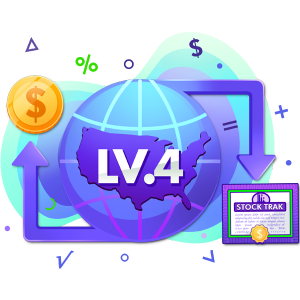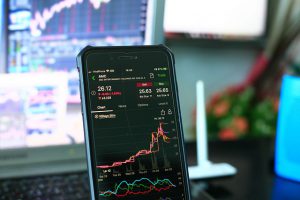2-08 What is a Brokerage?
When you are ready to start buying your own stock, you won’t withdraw some cash from the ATM, head to New York, and look for someone with paper shares to sell. Instead, you would open an account with a stock brokerage, where you will make your trades.
What is a Brokerage?
Brokerages exist to allow individuals to make investments into the larger market. In other words, they connect individuals to the markets as a whole. This means that a brokerage takes all of the trades that their clients make, packages them together, and makes the actual bids and asks on the stock exchange to execute the trades.
Brokerages also act as custodians – when you buy a stock, you will not get a paper certificate in the mail showing your stock ownership. Instead, your broker has a record of which stocks you own, along with what trades you have made. Think of your brokerage account like a bank account for investments – that is where the record of all of your investments is kept. Acting as a custodian, your brokerage reports all of this information to the tax agencies too – so there is a record of what you might owe from capital gains or dividend income.

Because of these responsibilities, stock brokers have very strict licensing requirements and need to be registered with regulatory agencies.
Broker-Dealers
Legally, what we call “Brokerages” for short are actually broker-dealers.
A “broker” is just someone who brings to people together to make a trade. Think of brokers like a middle-man, or a match-maker. A “dealer” is someone who is directly involved in the transaction, like a shopkeeper. They didn’t make the things available in their store, but they connected the sellers to you (the buyer) and was directly part of the buy/sell process.
Stock brokerages act in both roles – they connect you with all the other buyers and sellers in the market, but you make your transaction with the brokerage firm, not the other party of the transaction.
Different Types of Brokerages
Not all brokers are created equally. These are some of the different types of brokerages you might encounter:
Stocks vs Derivatives
“Stock Brokers” generally work just with stocks, ETFs, mutual funds, and stock options. Depending on the broker, they may also offer corporate or treasury bonds. These are the most common types of brokerages.
However, there are other brokerages that exist that specialize in Forex (trading foreign currencies), futures and commodities, cryptocurrencies, or other security types. The securities on offer vary significantly from brokerage to brokerage – if you want to invest in many different security types, you may end up needing multiple brokerage accounts with different brokers. For example, it is common for heavy traders to have a separate brokerage account for “Day Trading” from their retirement accounts.
Discount vs Full Service
A “Discount Broker” generally gives you an account, a way to make trades, and maybe some basic research tools. A “Full Service” broker typically has a person who is YOUR dedicated “broker”, and is also able to offer investing advice, financial planning, and tax help. Historically, most brokerages were “Full Service” brokers, where investors would call their dedicated stock broker to make trades, and the broker would have an active role in managing their portfolio.
Charles Schwab is considered the first “Discount Broker” who set up a bare-bones brokerage account service in the 1970s, relying heavily on automation and for investors to make their own decisions, calling in trades on a rotating hotline. With the advent of widespread internet service, discount brokerages moved online, allowing trades to buy and sell completely on their own.

Full Services brokerages typically have higher fees – often a percentage commission, or a large dollar amount for each trade. Discount brokers have much lower, and often zero fees.
How Brokerages Make Their Money
Brokerages have two main ways they make their money: either directly through commissions and fees (like a full-service brokerage), or through order manipulation.
“Order Manipulation” is when a brokerage takes extra steps beyond just sending your order to the market, where the broker can make money along the way. This is typically how “zero commission” brokers stay in business. Order manipulation is legal so long as you, the buyer or seller, get the same (or better) price as the actual market. Some ways orders can be manipulated include:
- Reserve stocks. Many brokerages keep popular stocks “in reserve”, or just owned by the brokerage themselves. When you want to buy a stock that the brokerage already owns, they can sell it directly from their reserve instead of sending the order to the full market. If the current price is higher than what they paid for the stock, the brokerage earns a profit on the transaction.
- Selling Volume. Many large investment banks like to be “Market Makers” – buying and selling such huge volumes of stock that it impacts the market price as a whole. The profit per share that they trade may only be fractions of a penny, but it adds up when they trade thousands of shares a second. Discount brokers can sell these market makers their “Order Flow” – instead of sending your trade to the actual exchange, it can go to these Market Makers, who pay the same (or better) price to your brokerage – and allowing the Market Makers to make bulk trades.
- Margin. If you trade “on margin”, it means you are borrowing money from your brokerage to increase your own buying power. You will be charged interest on your loan, which is revenue for your brokerage.
Order manipulation is perfectly legal and does not significantly impact the price you receive when trading. In fact, due to these other ways to make money, the average commission price plummeted over the last 30 years from over $50 per trade down to zero with nearly all discount brokerages.